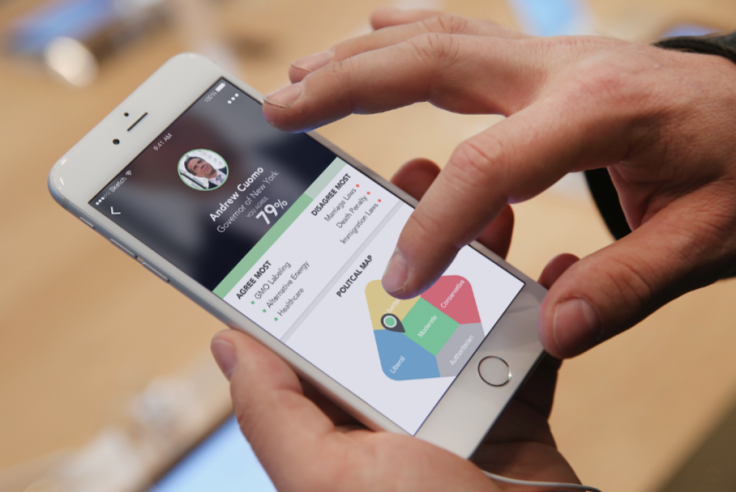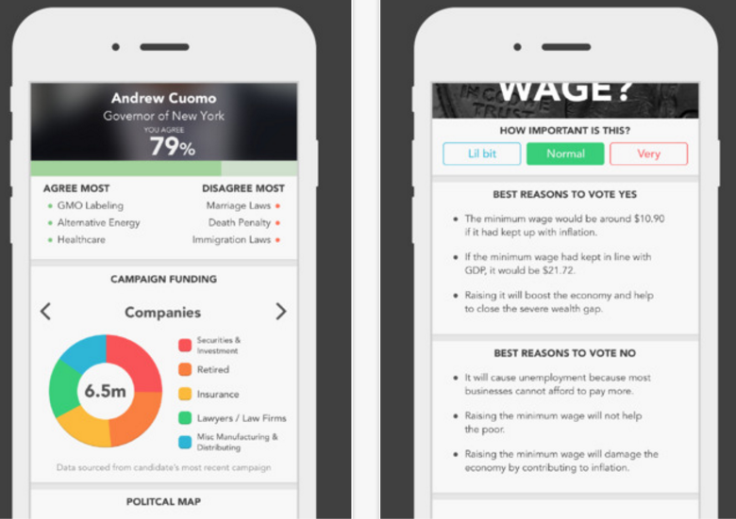Inside Voter: The ‘Tinder For Voting’ App That Has Sean Rad’s Stamp Of Approval

Despite Tinder's popularity among young people, presidential candidates this election season have been reluctant to embrace the matchmaking app as a campaign tool. But a new spin on the concept, borrowing the app's signature swipe function, has emerged as a way to educate and match voters to candidates aligned with the issues they care about.
Meet Voter, a new app that lets users swipe right for “yes” and left for “no” on issues just like they would for potential dates on Tinder. Hunter Scarborough, an entrepreneur in Los Angeles, and his co-founder Suneil Nyamathi, a programmer, created the app as a way for people to quickly and easily learn about important issues facing voters, and discover where candidates stand on them. Scarborough, 26, said he thinks people should vote based on stances that align with their own and not solely based on spectacles at campaign rallies or gaffes on social media.
The app, only available for iOS, displays yes-or-no questions on issues. Tapping on the card presents a user with more information, including arguments from both sides. Voter evaluates user responses with the views of potential presidential candidates and shows how closely matched you align with each one, on a percentage scale. Users can also see matches within the Senate and the House of Representatives, as of an update last week.
“The true purpose of the app is to give you confidence in your vote,” Scarborough said. “You could match Republican, and yet match with Hillary Clinton. If someone uses the app right in front of me, wires get crossed and they ask, ‘How did that happen?’ The way that candidate stands on the issues, that’s the missing component.”

Less than eight months into its public launch, the app has drawn 100,000 users. Scarborough prefers to tout a half-million matches and 25 million questions swiped. That could means users are, on average, doing the quiz five times or passing their phone off to friends to take it. Users can also connect to their Facebook friends on the app and choose to share their results.
Voter is currently pre-revenue, but it is looking to a revenue model that would include sponsored questions. For instance, a question on sustainability could be sponsored by an environmentally focused business or nonprofit organization.
Beyond being a consumer-facing app, Voter is a trove of data on politicians’ stances. Voter pulls in voting records as well as statements, speeches and interviews to provide context on the selected issues. Each component is ranked by an algorithm. For instance, more-recent votes weigh higher than previous legislative action. Yet, the correlation to the issue is going to be weaker than someone who votes consistently.
One presidential candidate has been especially tricky to map. “[Donald] Trump is interesting because we don’t have a voting record for him, so we have to listen closely to what he says,” Scarborough said.
Other politicians, at the local level, have reached out to Voter on ways to be involved. A candidate in a Senate race in California agreed to answer all the questions in Voter directly and rank them as priorities, thereby decreasing the degrees of separation between the company attempting to evaluate his stances and his personal views.
Voter has two research associates tasked with keeping the data up to date, “all day every day,” Scarborough said. He and Nyamathi are the remaining employees — outside of public relations — who also work on maintaining the accuracy and building the product.
Considering it has such a small team, Scarborough said the company has relied on a “very strong advisory board” of which Tinder CEO and co-founder Sean Rad is a member. Scarborough and Nyamathi had billed Voter as a “Tinder for politics” since the beta launch in July and again during the public release in September. In January, Rad reached out to the team, saying he had seen them in the press and was interested in building a “mini version of Voter,” Scarborough said.
Three months later, Tinder released “Swipe the Vote,” a feature within the dating app that offered 10 issue-based questions to match users with candidates. That system was empowered by Voter as well as Wedgies, a social polling platform. Democratic candidate Bernie Sanders and Republican candidate Ted Cruz had the most traction in the first day, Digital Trends reported.
No money was exchanged, but Scarborough said the partnership was worth it for publicity. “Tinder has 10 million daily users, so we weren’t going to say no to that kind of access, and our mission statement is to help people become more informed voters,” he said.
Rad continues to mentor and support Scarborough as well. "Given that Sean’s time is consumed by Tinder, he has only been able to serve as an informal adviser to Hunter, but he does believe the platform has real potential, as the Swipe the Vote campaign illustrated," Rosette Pambakian, vp of global communications and branding at Tinder, wrote in an email.

Voter also offers a tab called “Updates” that pulls from news APIs for select stories on political news. The selection is not based on the candidates you endorse or stances you take, unlike on Facebook. “In some ways the idea of making it curated based on the way you answer the questions is fantastic, but that’s the slippery slope,” Scarborough said.
Users can also click a link to register the vote, but Voter’s core mission is not getting people to the polls but rather keeping them informed.
Now that the latest feature update is released, the Voter team is looking to pull in revenue. That means locking down brands for sponsored questions as well as potentially providing data, which would be anonymized, to paying clients. The campaign behind one presidential candidate had inquired about accessing that data early on in Voter’s history, to which Scarborough declined.
Voter also plans to continue adding questions. The most recent update introduced a question on Syrian refugees and bodycams on police officers.
© Copyright IBTimes 2024. All rights reserved.






















